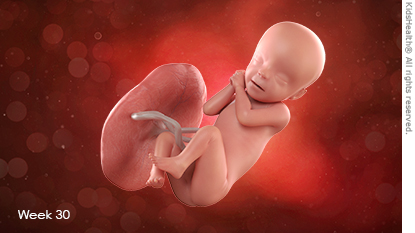- Home
- Humana Medicaid
- Kentucky Medicaid
- Medicaid extras
- Health and wellness
- Parents Home
- Para Padres
- A to Z Dictionary
- Allergy Center
- Asthma
- Cancer
- Diabetes
- Diseases & Conditions
- Doctors & Hospitals
- Emotions & Behavior
- First Aid & Safety
- Flu (Influenza)
- Food Allergies
- General Health
- Growth & Development
- Heart Health & Conditions
- Homework Help Center
- Infections
- Newborn Care
- Nutrition & Fitness
- Play & Learn
- Pregnancy Center
- Preventing Premature Birth
- Q&A
- School & Family Life
- Sports Medicine
- Teens Home
- Para Adolescentes
- Asthma
- Be Your Best Self
- Body & Skin Care
- Cancer
- Diabetes
- Diseases & Conditions
- Drugs & Alcohol
- Flu (Influenza)
- Homework Help
- Infections
- Managing Your Weight
- Medical Care 101
- Mental Health
- Nutrition & Fitness
- Q&A
- Safety & First Aid
- School, Jobs, & Friends
- Sexual Health
- Sports Medicine
- Stress & Coping
Pregnancy Calendar: Week 30
Your Baby's Development
Now weighing about 3 pounds (1,400 grams) and measuring about 10.8 inches (27 cm)  from crown to rump, your baby continues to gain weight and add layers of fat. This fat makes the baby look less wrinkly and will help provide warmth after birth.
from crown to rump, your baby continues to gain weight and add layers of fat. This fat makes the baby look less wrinkly and will help provide warmth after birth.
To prepare for breathing after birth, your baby will mimic breathing movements by repeatedly moving the diaphragm. Your baby can even get hiccups, which you may feel as rhythmic twitches in your uterus.

Your Body
 Constipation is a common complaint of pregnancy. Pregnancy hormones slow the digestive process considerably. Exercising regularly and eating high-fiber foods, like vegetables and whole grains, are great ways to keep everything regular.
Constipation is a common complaint of pregnancy. Pregnancy hormones slow the digestive process considerably. Exercising regularly and eating high-fiber foods, like vegetables and whole grains, are great ways to keep everything regular.

© 1995- The Nemours Foundation. KidsHealth® is a registered trademark of The Nemours Foundation. All rights reserved.
Images sourced by The Nemours Foundation and Getty Images.